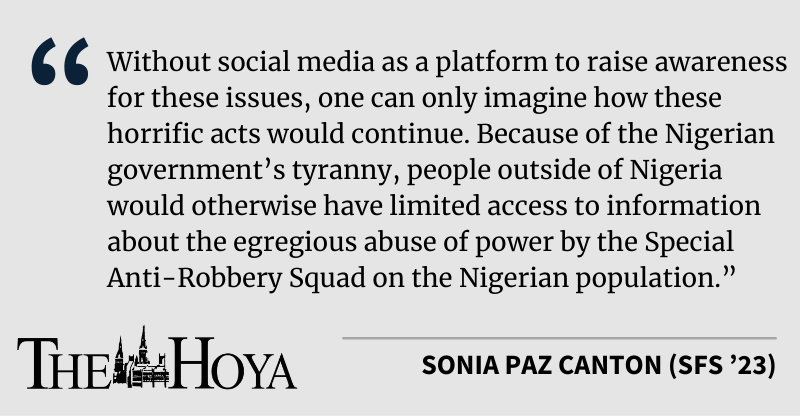The atrocious human rights crimes committed by the Special Anti-Robbery Squad have recently made headlines across social media platforms. From heinous viral videos of Nigerian youth being tortured to the broadcast of the various names of victims from SARS’ murderous actions, hearing about SARS is unavoidable. SARS is an arm of the Nigerian police force, founded in 1992 to combat robbery, investigate crime and detain criminals, but it has flagrantly violated its original mission. After enduring wrongful arrests, brutal beatings and unfounded deaths that disproportionately affect young people, Nigerians have banded together to protest SARS’ unceasing police brutality.
The international focus on Nigeria is predominantly the result of Nigerian youth advocacy against SARS. Social media’s prominence and influence on our generation serves as a valuable tool for understanding and standing in solidarity with the #EndSARS movement across Nigeria. The dissemination of international news on social media is a development that has changed our generation’s awareness of and connection to communities around the world. Young people have been educating themselves on important international topics through social media platforms. Because these platforms contain information in an unceasing and often polarizing manner, as in the case of Nigeria, youth advocacy for justice has been transformed.
These posts, while certainly educational, do not fully capture the extreme and dire situation in Nigeria. Most times, they leave out valuable information on how SARS came to be, how to best take action, and often are only posted for a short browsing period. Yet, social media, however performative — that is, done to increase one’s social capital rather than because of one’s devotion to a cause, proves an essential tool in giving agency to the humanitarian cause in Nigeria. Georgetown students must use our unparalleled power to communicate in a way that effectively advocates for those marginalized and oppressed in our society. With this innovative power in regards to making our voices heard and expressing our opinions, we can have positive effects on the well-being of global communities.
On Oct. 3, the police brutality crisis in Nigeria finally received the public attention it deserved after a video of SARS officials brutalizing a young Nigerian man went viral. Like the Black Lives Matter protests in the United States, Nigerians face increased violence by SARS at protests, where officers use dangerous counterprotest tactics such as tear gas and rubber bullets against civilians.
SARS has been responsible for unjust violence against the Nigerian population. On Oct. 20, the Nigerian government shot at anti-SARS protestors, killing at least 11 people and injuring many more. A simple groomed beard, AirPods and clean shoes can and have been the deadly causes for which SARS officers murder innocent Nigerian youth. Without social media as a platform to raise awareness for these issues, one can only imagine how these horrific acts would continue. Because of the Nigerian government’s tyranny, people outside of Nigeria would otherwise have limited access to information about the egregious abuse of power by SARS on the Nigerian population.
Difficult economic conditions, heightened by financial instability and bad governance, have recently plagued Nigeria, exacerbating the suffering under SARS. Social media has amplified stories, giving people the platforms to educate others and bring to light many important issues that were formerly unknown to many people. Now is the time to use the same active and vocal energy we have for Black Lives Matter in the United States to support the Nigerian effort to dismantle SARS and its brutality. As citizens of the digital world, our generation must use the platform it has to spread awareness of the issue, donate and promote resources to assist vulnerable populations. People can avoid being performative by not abiding just to trends, truly promoting and learning substantive information, owning past mistakes and avoiding any shaming of others who are on different paths of education.
Police brutality is not confined to any state and is in no way a new phenomenon. But by focusing our attention on the situation in Nigeria, we as a generation can take action and amplify the voices of those left voiceless by oppressive institutions and powerful, abusive elites. Although we should be careful about sharing traumatic content that could potentially trigger certain groups of people, posting on social media is necessary in order to be transparent about the injustices happening both at home and around the world.
We live in an age of information, and we can no longer remain ignorant and passive to the cruelties that face communities around the world. We must voice our outrage about human rights violations and carry out direct action whenever and however possible. We cannot engage in performative activism by posting without getting actively involved, which proves to be harmful to the progressive movements like #EndSARS and #BlackLivesMatter. We must center our conversations around being agents of peace and connecting ourselves further with the world around us. #EndSARS.
Sonia Paz Canton is a sophomore in the School of Foreign Service.









